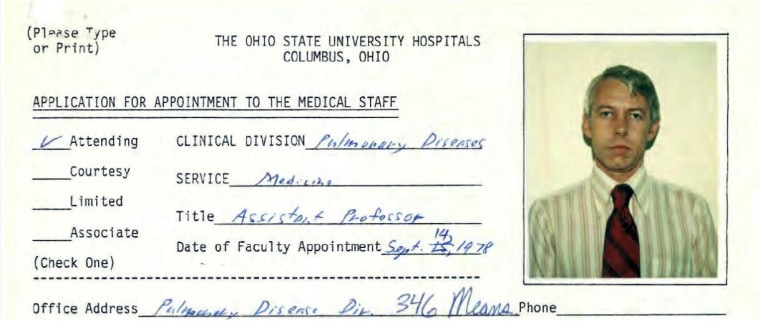Ohio State University announced Friday that independent investigators had interviewed more than 200 former students and staff in its investigation into allegations of sexual misconduct raised against Dr. Richard Strauss, a physician employed at the university from the mid-1970s to the 1990s.
Ohio State began a formal investigation into the doctor in April and more than 100 former Ohio State University students have reported being victims of sexual misconduct by Strauss, a university spokesperson said Friday. Since Strauss killed himself in 2005, he will never be charged or held criminally liable.

What about possible criminal liability for other remaining faculty members or employees of the university?
It’s possible that a creative prosecutor could articulate a theory of criminal responsibility for members of the Ohio State community who knew or even should have known about abuse of the students. But it’s not likely.
One might consider as precedent, for instance, the Jerry Sandusky case at Penn State University. Former PSU President Graham Spanier was convicted in 2017 of covering up child sexual abuse allegations in 2001 against Sandusky. Athletic director Tim Curley and vice president Gary Schultz also pleaded guilty to misdemeanor child endangerment, and testified against Spanier at his trial.
The Penn State case differs significantly from the Ohio State investigation in that Penn State involved the abuse of children. The duty to report suspected sexual assault of adults involves a different set of laws.
Pennsylvania law imposes mandatory reporting requirements on people who interact with children as part of their employment, when they have “reasonable cause” to suspect that a child is the victim of sexual abuse based on their “medical, professional, or other training and experience.”
If all of the alleged Ohio State victims were 18 or over, the age of majority in Ohio, then any similar Ohio law mandating reporting of sexual abuse of a child would probably not apply. In a lawsuit filed against Ohio State, however, one of the plaintiffs alleges he was 14 years old when the abuse began.
Meanwhile, at another Big Ten university, Michigan State University, the former dean of MSU's College of Osteopathic Medicine, William Strampel, faces charges that arose in connection with the investigation of his subordinate, Dr. Larry Nassar, the MSU doctor who was convicted of sexual abuse of scores of female patients and athletes.
A judge at Strampel’s preliminary hearing in June ruled there was enough evidence for charges of misconduct in office, and criminal sexual conduct to move forward to trial. In that case, however, witnesses testified that Strampel indirectly propositioned them for sex during meetings, and another said Strampel groped her at a public event. The former dean is not charged with mere knowledge and failure to report abuse; he’s charged with his own crimes, independent of Nassar’s conduct.
Even if one Ohio State official’s failure to report his or her mere suspicion of sexual assault of an adult by another university employee is not automatically a crime in Ohio, it’s certainly a violation of university policy. And, if a violation of policy is deemed a violation of a duty, it’s not a great leap to say that a serious enough violation of a legal duty constitutes the gross negligence which would support a criminal charge.
At Ohio State University, all employees have a duty to report sexual misconduct, which is “conduct of a sexual nature or conduct based on sex or gender that is nonconsensual or has the effect of threatening, intimidating, or coercing a person.” Anyone who supervises students; chairs/directors; and all faculty members have a heightened responsibility to report incidents of sexual misconduct, because of their positions of authority. While that’s the policy today, it might not have been the policy during the Strauss era at Ohio State.
It’s not a stretch for a prosecutor to find criminal culpability for an egregious, intentional violation of a known duty, especially in the case of a professional like a doctor.
Danny Cevallos is an MSNBC legal analyst. Follow @CevallosLaw on Twitter.